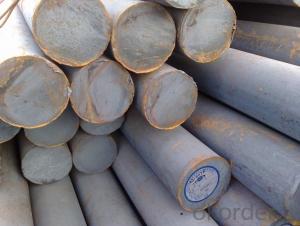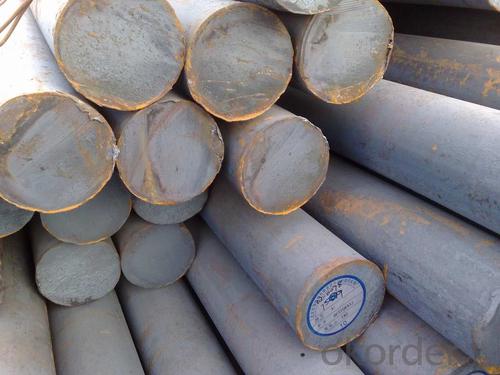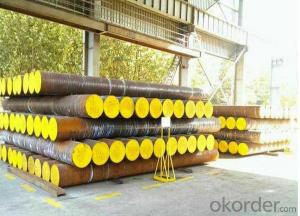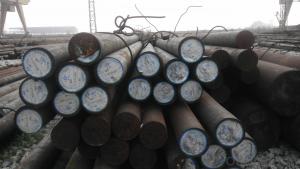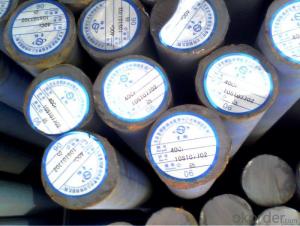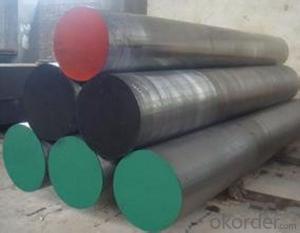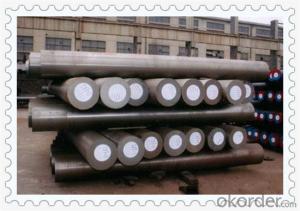Special Steel 1.7225 Steel Round Bar / SCM440 Round Bar
- Loading Port:
- China main port
- Payment Terms:
- TT or LC
- Min Order Qty:
- 25 m.t.
- Supply Capability:
- 10000 m.t./month
OKorder Service Pledge
OKorder Financial Service
You Might Also Like
Specification
The details of our Steel
1. Produce Standard: as the GB, AISI, ASTM, SAE, EN, BS, DIN, JIS Industry Standard
2. Produce processes: Smelt Iron -EAF smelt Billet - ESR smelt Billet -Hot rolled or forged get the steel round bar and plate
3. Heat treatment:
Normalized / Annealed / Quenched+Tempered
4. Quality assurance:
All order we can received Third party inspection, You can let SGS, BV,.. and others test company test and inspect our products before Goods shipping.
Product information
Chemical Composition(%) of SCM440 round bar | C | Si | Mn | P | S | Cr | Mo |
0.38-0.45 | ≤0.40 | 0.60-0.90 | ≤0.035 | ≤0.035 | 0.90-1.20 | 0.15-0.30 | |
Specification of SCM440 round bar | Hot Rolled: Dia.(mm)*L(mm)=14-20*2000-6000 | ||||||
Forged: Dia.(mm)*L(mm)=210-800*2000-6000 | |||||||
Application of SCM440 round bar | (1) unibody electrical and electronic mold; (2) plastic mould and die holders; (3) making main shaft of streamer, bolt for 400°C; (4) making the hammer stem and aggravating drill pipe. | ||||||
Characteristic of SCM440 round bar | (1) High strength and toughness; (2) Good hardenability and the quenching deformation is small; (3) Good processability and easy polishing; (4) Easy texture and platable; (5) The strength and section are bigger than 35CrMo(4135). | ||||||
Heat Treatment of SCM440 round bar | Forging:1100~900°C Normalization:860~880°C Subcritical Annealing:680~720°C Isothermal Annealing:830~900 670x3h°C Hardening:830~860 oil Tempering:550~650°C | ||||||
Mechanical Property of SCM440 round bar | Rm(MPa): 1080 Re(MPa): 930 Ae%: 12 Z%: 45 A(S): 63 | ||||||
Delivery Condition of SCM440 round bar | hot rolled, black surface, annealed | ||||||
Payment Term of SCM440 round bar | L/C,T/T,30% in advance,70% before the shipment | ||||||
Main product
High speed steel | |
AISI | M2,M4,M35,M42,T1 |
DIN | 1.3343,1.3243,1.3247,1.3355 |
JIS | SKH51,SKH54,SKH35,SKH59,SKH2 |
Cold work tool steel | |
AISI | D2,D5,D3,D6,A8,A2,O1 |
DIN | 1.2379,1.2601,1.2080,1.2436,1.2631,1.2363,1.2510,1.2327 |
JIS | SKD10,SKD11,SKD1,SKS3 |
Hot work tool steel | |
AISI | H13,H11,H21 |
DIN | 1.2344,1.2343,1.2367,1.2581,1.2713 |
JIS | SKD61,SKD6,SKD7,SKD5SKT4 |
Plastic mould steel | |
AISI | P20,P20+Ni,420 |
DIN | 1.2311,1.2738,1.2083,1.2316 |
JIS | PDS-3,SUS420J1,SUS420J2 |
Alloy structural seel | |
AISI | 5140,4340,4135,4140 |
DIN | 1.7035,1.6511,1.7220,1.7225 |
JIS | SCr440,SNCM439,SCM435,SCM440 |
Stainless steel | |
AISI | 440C,420,430 |
DIN | 1.4125 |
JIS | SUS440C |
Carbon steel | |
AISI | 1045,1020 |
DIN | 1.1191 |
JIS | S45C, G3101 |
Product show

Workshop show

Shipping
1. FedEx/DHL/UPS/TNT for samples, Door-to-Door;
2. By Air or by Sea for batch goods, for FCL; Airport/ Port receiving;
3. Customers specifying freight forwarders or negotiable shipping methods!
Delivery Time: 3-7 days for samples; 5-25 days for batch goods.
Payment Terms
1.Payment: T/T, L/C, Western Union, MoneyGram,PayPal; 30% deposits; 70% balance before delivery.
2.MOQ: 1pcs
3.Warranty : 3 years
4.Package Informations: 1) EXPORT, In 20 feet (GW 25 ton) or 40 feet Container (GW 25 ton)
2)as customer's requirement
Why choose us?
(1) The leading exporter in China special steel industry.
(2) Large stocks for various sizes, fast delivery date.
(3) Good business relationship with China famous factories.
(4) More than 7 years steel exporting experience.
(5) Good after-sales service guarantee.
- Q: What are the different special steel products available in the market?
- In the market, one can find a wide range of special steel products that are specifically designed to meet various industrial needs. Some commonly used special steel products include: 1. Stainless Steel: This particular steel alloy is highly resistant to corrosion due to its minimum chromium content of 10.5%. It finds extensive use in applications that demand exceptional corrosion resistance, such as kitchen utensils, medical instruments, and chemical processing equipment. 2. Tool Steel: Tool steel is a type of carbon and alloy steel that is exclusively manufactured for tool production. It is renowned for its high hardness, resistance to abrasion, and ability to maintain sharp edges. Tool steel is widely employed in the fabrication of cutting tools, dies, and molds. 3. Alloy Steel: Alloy steel is a type of steel that has been blended with other elements like manganese, silicon, nickel, or chromium to enhance its mechanical properties. It offers superior strength, toughness, and wear resistance compared to carbon steel. Alloy steel is used in various applications, including automotive components, construction equipment, and machinery parts. 4. High-Speed Steel: High-speed steel is a variant of tool steel that exhibits the ability to cut at high speeds without compromising its hardness or its ability to retain sharp edges. It is commonly utilized in the production of drills, milling cutters, and saw blades. 5. Spring Steel: Spring steel is a low-alloy, medium or high carbon steel that possesses remarkable shape retention and elasticity even under high stress or repeated loadings. It finds extensive use in the manufacturing of springs, suspension systems, and shock absorbers. 6. Electrical Steel: Electrical steel, also known as silicon steel, is an exceptional steel alloy that demonstrates low electrical losses and high magnetic permeability. It is employed in the fabrication of electrical transformers, motors, and generators. 7. Heat-Resistant Steel: Heat-resistant steel is specifically engineered to withstand high temperatures without compromising its mechanical properties. It is commonly utilized in applications such as furnaces, heat exchangers, and gas turbines. These examples merely scratch the surface of the wide array of special steel products available in the market. The selection of a particular steel product depends on the specific requirements of the application, including factors like corrosion resistance, strength, hardness, and heat resistance.
- Q: What are the different methods of surface thermal spraying for special steel?
- There are several different methods of surface thermal spraying that can be used for special steel. These methods include: 1. Flame spraying: In this method, a flame or oxy-fuel source is used to melt the coating material, which is then sprayed onto the surface of the special steel. This method is commonly used for applying coatings such as zinc, aluminum, or their alloys. 2. Arc spraying: Arc spraying involves using an electric arc to melt the coating material, which is then propelled onto the surface of the special steel using compressed air. This method is often used for applying coatings such as stainless steel, nickel alloys, or copper. 3. Plasma spraying: Plasma spraying utilizes a plasma torch to heat and melt the coating material, which is then propelled onto the surface of the special steel. This method is particularly effective for applying coatings such as ceramic or metallic materials with high melting points. 4. High-velocity oxy-fuel (HVOF) spraying: HVOF spraying involves using a high-pressure combustion process to propel the coating material onto the surface of the special steel. This method produces coatings with high bond strength and density, making it suitable for applications requiring wear resistance or corrosion protection. 5. Detonation spraying: Detonation spraying utilizes a controlled detonation process to accelerate the coating material onto the surface of the special steel. This method is often used for applying coatings such as tungsten carbide or other hard materials, providing excellent wear resistance. Each of these methods of surface thermal spraying offers distinct advantages and is selected based on the specific requirements of the special steel application, including the desired coating material, thickness, and performance characteristics.
- Q: What are the limitations of special steel in certain applications?
- The limitations of special steel in certain applications include its high cost compared to regular steel, limited availability, and the need for specialized manufacturing processes. Additionally, special steel may not be suitable for applications requiring high temperature resistance or extreme corrosion resistance, as other materials like stainless steel or alloys might be more suitable.
- Q: What are the applications of special steel in the automotive supply chain?
- Special steel has various applications in the automotive supply chain. It is widely used in the manufacturing of engine components, such as crankshafts, camshafts, and connecting rods, due to its high strength and resistance to wear. Special steel also finds application in the production of suspension and steering components, as well as gears and shafts, which require excellent toughness and durability. Moreover, it is utilized in the fabrication of safety-related parts like seat belt anchors and airbag systems, ensuring the necessary strength and reliability. Overall, special steel plays a crucial role in enhancing performance, safety, and efficiency in the automotive industry.
- Q: How does the carbon content affect the properties of special steel?
- The carbon content plays a crucial role in determining the properties of special steel. Higher carbon content tends to enhance its hardness, strength, and wear resistance. This is because carbon forms interstitial solid solutions with iron, creating stronger and more stable iron carbides. On the other hand, lower carbon content leads to increased ductility and toughness. The carbon content also influences the steel's ability to be heat-treated, affecting its response to processes like quenching and tempering. Therefore, controlling the carbon content allows manufacturers to tailor the properties of special steel to meet specific application requirements.
- Q: How does hot rolling affect the microstructure of special steel?
- Hot rolling affects the microstructure of special steel by causing recrystallization and grain growth. The high temperature during the rolling process allows the steel to undergo plastic deformation, leading to the formation of new grains with a finer size. This results in improved mechanical properties such as increased hardness and strength. Additionally, hot rolling can also help in eliminating any residual stresses and improving the overall homogeneity of the steel's microstructure.
- Q: What are the challenges in welding special steel alloys?
- Welding special steel alloys presents various obstacles due to their distinct properties and composition. Key challenges encountered when welding special steel alloys include the following: 1. Elevated melting point: Special steel alloys typically possess higher melting points compared to regular steel, necessitating increased heat input during the welding process. This can create difficulties in achieving proper fusion and may require specialized welding equipment and techniques. 2. Disparity in thermal expansion: Special steel alloys may exhibit different coefficients of thermal expansion in comparison to the base metal or other materials being joined. This can result in the development of stress and distortion during welding, impacting the structural integrity of the welded joints. 3. Heat sensitivity: Certain special steel alloys are more susceptible to heat-affected zone (HAZ) cracking and other forms of weld defects. The heightened heat input during welding can induce the formation of brittle phases or precipitates, leading to reduced mechanical properties and potential weld failures. 4. Metallurgical alterations: Welding special steel alloys can bring about significant metallurgical changes in the base metal and the heat-affected zone. These changes encompass the formation of new microstructures, variations in hardness, and modifications in chemical composition. Such alterations can affect the overall performance and properties of the welded joints. 5. Pre-weld and post-weld treatments: Specific pre-weld and post-weld treatments are often required for special steel alloys to minimize the risk of weld defects and optimize the properties of the welded joints. These treatments may encompass preheating, post-weld heat treatment, or the utilization of specialized filler metals to ensure adequate weld integrity. 6. Limited consumable availability: Special steel alloys may have a limited selection of suitable consumables, such as filler metals and shielding gases, which are vital for achieving high-quality welds. The absence of appropriate consumables can make it challenging to find compatible materials that offer sufficient strength and corrosion resistance in the welded joints. To overcome these challenges effectively, it is essential to possess a comprehensive understanding of the specific properties and requirements of the special steel alloy being welded. The utilization of proper welding techniques, including heat control, filler material selection, and post-weld treatments, is crucial to ensure welds of superior quality with optimal mechanical properties and structural integrity. Moreover, collaborating with material suppliers, welding experts, and adhering to industry standards and guidelines can facilitate the effective resolution of challenges associated with welding special steel alloys.
- Q: How does the cost of special steel compare to regular steel?
- The cost of special steel is generally higher than regular steel due to its unique properties, manufacturing processes, and limited availability.
- Q: What is the purpose of cold drawing in special steel production?
- The purpose of cold drawing in special steel production is to enhance the mechanical properties and improve the dimensional accuracy of the steel. Cold drawing involves pulling the steel through a die at room temperature, which increases its tensile strength, hardness, and surface finish. This process also allows for precise control over the final dimensions and shapes of the steel, making it suitable for various specialized applications.
- Q: What are the applications of special steel in the agriculture sector?
- Special steel has numerous applications in the agriculture sector. It is used in the manufacturing of machinery and equipment such as plows, cultivators, and harvesters, due to its high strength and durability. Special steel is also utilized in the production of storage tanks and silos, providing protection against corrosion and ensuring the safety of agricultural products. Additionally, it is employed in the fabrication of irrigation systems, fencing, and animal enclosures, offering longevity and resistance to wear and tear. Overall, special steel plays a crucial role in improving productivity and efficiency in various agricultural operations.
Send your message to us
Special Steel 1.7225 Steel Round Bar / SCM440 Round Bar
- Loading Port:
- China main port
- Payment Terms:
- TT or LC
- Min Order Qty:
- 25 m.t.
- Supply Capability:
- 10000 m.t./month
OKorder Service Pledge
OKorder Financial Service
Similar products
Hot products
Hot Searches
Related keywords
